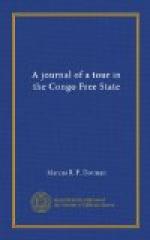Next day we stop at Bobanghe, a native Wood-Post, and go ashore. The huts here are thatched with grass, for palms seem scarce. Some of the men have black beards which they plait into one or two tails, producing a curious appearance and while they fish, the women do the work of the village and the marketing. Several of them were sitting on logs, contentedly puffing tobacco smoke from wooden pipes while they offered fish, fruit and vegetables for sale to our crew and native passengers. One variety of fish was particularly noticeable; it was coloured like a trout, but had a long snout on the dorsal side. We bought one, and it proved very good eating. The forest here is full of rubber plants, nearly every vine and leaf, when broken, yielding the milky sap which dries, or can be coagulated, into rubber.
One day the boy Jean fell overboard, but leisurely undressed in the water and swam to the bank, whence he was rescued by the canoe of the steamer. He was perfectly calm but Chikaia burst into tears and loudly blubbered. Very little indeed is sufficient to arouse emotionalism in some-of the natives, who are always laughing or crying, fortunately the former more often than the latter.
The banks of the Ubangi descend as a rule, sheer into deep water and are often indeed miniature cliffs. No attempt is made to fashion steps and the villagers slide down the banks as best they can and thus form a rude path to the water. A half dozen men in an hour could make a convenient inclined plain or steps, but the native only does what work is absolutely necessary in order to live, and although loving ease, will not take the trouble to make himself more comfortable. So he climbs painfully up the bank every night from his canoe and slides down again every morning without attempting to improve the path. The vanity of the native however, causes him to take great pains to—as he thinks—improve his personal appearance. Brass collars and bangles are very uncommon on the Ubangi and beads take their place. The women wear short skirts made of vegetable fibres plaited, which must take days or weeks to construct. These are black or red in colour and are suspended from the waist, but as the fibre is somewhat stiff, they project all round like the dress of a ballet dancer. These are peculiar to the Ubangi and are rarely worn by other tribes. The men wear only loin cloths and often carry a large straight knife suspended by a leather belt strapped round the chest.
It is very hot from midday to sunset, but the nights are comparatively cool. One afternoon we saw a great number of serpent-birds perched high up on a bulbous tree, and, as they are good to eat, stopped to shoot some. They were not at all shy and did not depart after several shots had been fired, but wheeled round and round as if to discover what was the cause of the strange noise. Ball, 3 and 5’ shot were equally efficacious and more than a dozen fell in a few minutes. These birds have a beautiful black and white plumage with a long neck and bill and webbed feet and weigh five or six pounds each. The flavour is somewhat like ptarmigan and the natives eat them, as usual, without waiting until they were properly cooked.




